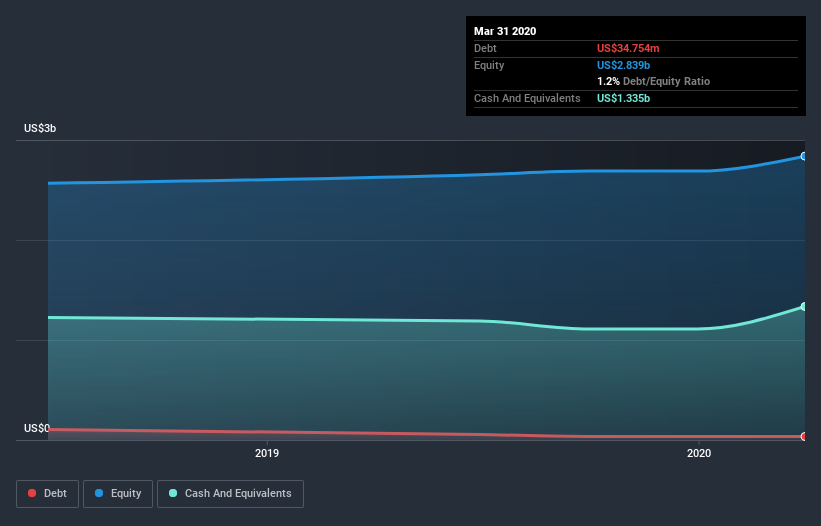Is Madison Square Garden Entertainment (NYSE:MSGE) Using Debt Sensibly?

Howard Marks put it nicely when he said that, rather than worrying about share price volatility, 'The possibility of permanent loss is the risk I worry about... and every practical investor I know worries about.' So it might be obvious that you need to consider debt, when you think about how risky any given stock is, because too much debt can sink a company. We note that Madison Square Garden Entertainment Corp. (NYSE:MSGE) does have debt on its balance sheet. But is this debt a concern to shareholders?
When Is Debt A Problem?
Debt assists a business until the business has trouble paying it off, either with new capital or with free cash flow. Part and parcel of capitalism is the process of 'creative destruction' where failed businesses are mercilessly liquidated by their bankers. While that is not too common, we often do see indebted companies permanently diluting shareholders because lenders force them to raise capital at a distressed price. Of course, the upside of debt is that it often represents cheap capital, especially when it replaces dilution in a company with the ability to reinvest at high rates of return. When we examine debt levels, we first consider both cash and debt levels, together.
See our latest analysis for Madison Square Garden Entertainment
What Is Madison Square Garden Entertainment's Net Debt?
As you can see below, Madison Square Garden Entertainment had US$34.8m of debt at March 2020, down from US$54.6m a year prior. But it also has US$1.33b in cash to offset that, meaning it has US$1.30b net cash.
A Look At Madison Square Garden Entertainment's Liabilities
Zooming in on the latest balance sheet data, we can see that Madison Square Garden Entertainment had liabilities of US$625.7m due within 12 months and liabilities of US$362.6m due beyond that. Offsetting these obligations, it had cash of US$1.33b as well as receivables valued at US$115.7m due within 12 months. So it can boast US$462.3m more liquid assets than total liabilities.
This excess liquidity suggests that Madison Square Garden Entertainment is taking a careful approach to debt. Because it has plenty of assets, it is unlikely to have trouble with its lenders. Succinctly put, Madison Square Garden Entertainment boasts net cash, so it's fair to say it does not have a heavy debt load! When analysing debt levels, the balance sheet is the obvious place to start. But ultimately the future profitability of the business will decide if Madison Square Garden Entertainment can strengthen its balance sheet over time. So if you want to see what the professionals think, you might find this free report on analyst profit forecasts to be interesting.
In the last year Madison Square Garden Entertainment had a loss before interest and tax, and actually shrunk its revenue by 4.9%, to US$984m. We would much prefer see growth.
So How Risky Is Madison Square Garden Entertainment?
Statistically speaking companies that lose money are riskier than those that make money. And in the last year Madison Square Garden Entertainment had an earnings before interest and tax (EBIT) loss, truth be told. And over the same period it saw negative free cash outflow of US$212.6m and booked a US$165.6m accounting loss. But the saving grace is the US$1.30b on the balance sheet. That kitty means the company can keep spending for growth for at least two years, at current rates. Even though its balance sheet seems sufficiently liquid, debt always makes us a little nervous if a company doesn't produce free cash flow regularly. There's no doubt that we learn most about debt from the balance sheet. But ultimately, every company can contain risks that exist outside of the balance sheet. Consider for instance, the ever-present spectre of investment risk. We've identified 2 warning signs with Madison Square Garden Entertainment , and understanding them should be part of your investment process.
If you're interested in investing in businesses that can grow profits without the burden of debt, then check out this free list of growing businesses that have net cash on the balance sheet.
This article by Simply Wall St is general in nature. It does not constitute a recommendation to buy or sell any stock, and does not take account of your objectives, or your financial situation. We aim to bring you long-term focused analysis driven by fundamental data. Note that our analysis may not factor in the latest price-sensitive company announcements or qualitative material. Simply Wall St has no position in any stocks mentioned.
Have feedback on this article? Concerned about the content? Get in touch with us directly. Alternatively, email editorial-team@simplywallst.com.

 Yahoo News
Yahoo News 

